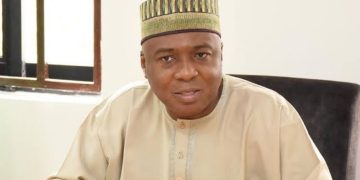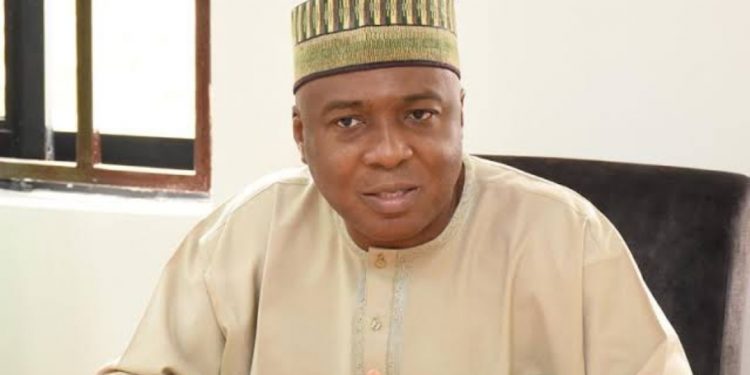By John Ikani
Former Senate President of Nigeria, Dr. Abubakar Bukola Saraki, has appealed to lawmakers not to make direct primaries compulsory for parties in choosing candidates for elections.
Saraki’s appeal comes as members of the National Assembly are in the process of reconciling the different versions of the Electoral Act (amendment) Bill passed by both chambers.
The ex-lawmaker in a statement by Yusuph Olaniyonu, Head of his Media Office, noted that the decision to include a provision in the proposed Electoral Act which makes it compulsory for parties to adopt direct primaries will only create a fresh problem while trying to solve an existing one.
He added that many of the political parties lack the necessary infrastructure to successfully conduct direct primaries at all levels and the attempt will lead to hundreds of litigations that may jeopardize the general election.
What Saraki said:
“I feel compelled to once again appeal to Distinguished Senators and Honourable Members of the House of Representatives on the proposed Electoral Act because I realise that while the focus of the general public has been on how to get the electronic transmission of results into the proposed law, another potential problem that may clog our electoral process is included in the Electoral Act is this provision on direct primaries.
“The two options on the table are to make direct primaries compulsory for all the parties or to leave it open for parties to decide. We should take the latter option. Let us leave each party to decide how it wants to source its candidates. The experience we have in the past shows that direct primary will lead to a crisis if forced on the parties. We saw how people sent from the national headquarters to conduct primary elections stayed in hotel rooms and conjured up figures which were announced as the result of direct primary elections.
“Even if the big parties have the funds and facilities to organise direct primaries nationwide, how about the smaller parties? Can the big parties also provide the facilities and election officials that will be present in all the polling units in the country, either simultaneously or in staggered primaries? Do most of the parties have valid and verified membership registers and other logistics needed for the successful conduct of direct primaries? The direct primaries option will also put pressure on the Independent National Electoral Commission (INEC) whose officials must monitor all the primaries.
“The direct primaries provision may work for us in the future but not now that we are not prepared for it as the primaries may hold next June. That is just nine months from now. The time for adequate and necessary preparations towards direct primaries is even not there. There will be so many litigations arising from the process. Do we have the time to hold crisis-free primaries and not create booby-traps for the general elections?
“From my experience, this issue of direct primaries was raised in the Eighth National Assembly when we passed the Electoral Act (amendment) Bill. It has always reared its head as a fall-out of the internal dynamics in certain parties where legislators feel they have been short-changed in the congresses where state governors seized the structure because they felt the process was neither transparent nor free and fair. The legislators may now see the process of passing the Electoral Act as a means to settle the scores. However, in the process that we have now, it is the country that will lose. It is our electoral process that will be undermined.
“My appeal goes to all members of the National Assembly. Please, do not let us take a position on critical issues based on partisan and personal consideration. Let us put Nigeria first and act in the best interest of our country. During our time in the National Assembly whenever we were confronted with issues like this, we just appealed and prevailed on members to put the nation first before any other consideration. I believe the same appeal should go to the present federal lawmakers.
“At this point, we also call on the leadership of the various parties to intervene and call all their stakeholders together to address the issues. The bulk of the responsibility to make the legislators do the right thing falls on the ruling party, the APC. It has the numbers to pass whatever bill the leadership desire in the National Assembly. The party should get its members to avoid including provisions in the proposed Electoral Act which may later become a major clog in the smooth conduct of our elections and the credibility of the electoral process.”




































